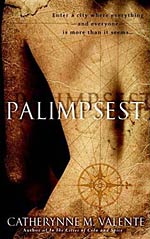
![]() couchtomoon
couchtomoon
12/9/2013
![]()
Lewis Carroll meets Anne Rice (the erotica years) in this surreal urban fantasy about four individuals who travel to the city of Palimpsest via a sex portal. Yes, you read that correctly: In order to visit the city, instead of going down the rabbit hole, you need to go down someone else's hole.
Sorry.
Palimpsest by Catherynne Valente is an adult fairy tale in every sense, and not for the pearl-clutchers who may accidentally pick up this book expecting a story about medieval manuscripts. But, that's not to say that this is a one-handed read, either. Fans of the recent boon in erotic fiction probably won't be satisfied. The sex happens in the real world, among ugly, destitute characters who view sex as a mere gateway, and sometimes obstruction, to their dream city. There may be a few titillating phrases here and there, but this is not erotica. Sometimes, the sex seems incidental, as if all the good portals have already been taken.
The Synopsis
A beekeeper, a locksmith, a bookbinder, and a blue-haired train enthusiast notice the appearance of a map-like tattoo on their bodies after a strange sexual encounter. This tattoo acts as a calling card to other people with similar tattoos who lure the main characters into a series of more sexual forays, each of which are followed by a dreamy visit to the area of Palimpsest that corresponds to the map tattooed on their partners' bodies. The more strangers one hooks up with, the more areas of Palimpsest one gets to visit. The story follows the four characters as they discover more secrets of the city with each sexual encounter, while their lives in the real-world erode and collapse. The group seeks to become permanent members of the Palimpsest society, but there is a strong bias against immigrants and a vague war, which may or may not still be happening, that permeates the landscape. The city is populated with surgically-altered animal people, rambunctious trains, unfinished clone children, and a wealthy empress-type woman who seems to control the whole thing with her clockwork insects.
Valente's flowery, buttery language is the first thing readers will notice, and it can either charm or repel. The pages brim with adjectives and adverbs, colors and textures. It's like reading a fabric cabinet. The initial pages are heavy with this technique, layered on top of ornate vocabulary, which feels pretentious, especially after reading the Shakespearean epigraph. But the pretense wears off as the story falls into its own rhythm and shakes off just enough of the gilded vernacular to feel genuine. Personally, I enjoyed the prose, but I can imagine some of my fellow SF readers might recoil.
A great strength of this story is its ethnic and sexual diversity, which has won Valente accolades. The main characters are American-Hispanic, Japanese, Russian-American, and Italian, and they participate in various forms of sexual relationships, both during and prior to their exploration of Palimpsest. Even the occupations and hobbies of these characters drip with sexual connotations that allude to the represented orientations: a woman with a honey hive, a man who matches keys with locks, a woman thrilled by trains, a man preoccupied by the opening and closing of books. The diversity is appreciated, but it doesn't matter in the end when these characters are doing anybody with a tattoo for a chance to visit the city. I wish these relationships had reached an intimacy beyond sex and desperation (it would be nice to see some healthy sexual diversity in fiction), although that would defeat the purpose of the story.
And that's where my apprehensions are raised. This story seeks to be modern and inclusive, but it can also be read as a haunting analogy about addiction at the cost of reality, health, and intimacy. It's not a groundbreaking analogy, and I fear that comparing sex to drug use perpetuates our society's unhealthy attitude toward sex. The story's association of sex with degradation brings to mind sterile, Puritanical views of copulation. "Don't sleep around or Palimpsest will take you." It's almost like Palimpsest is the sexual bogeyman. The real world doesn't need a fairy tale like that. The real world has STD's and unwanted pregnancies.
But it only matters if Valente is trying to tell us something, which I don't think she is. This is more tour guide than storybook, and Valente's urban landscape and quirky freaks matter more to her than any social commentary or character growth.The plot is minor, and what exists includes annoying holes and vague, unsatisfying explanations. The story is dotted with hints about the Palimpsest war, but is never fleshed out. The single action sequence is awkward and leaves much to be unraveled. Also, how exactly does this sex portal work? Why no condoms? Does Palimpsest require exchange of body fluids? Can one diddle oneself? Beyond these questions, character motivation is slim and sometimes contradictory. People change without much elaboration.
But it's pretty! And quite brief at only about 200 digital pages. Fans of Valente would probably agree that she has stronger works to sample her imaginative ideas and flowery language. Ultimately, the plot of Palimpsest won't drive the reader to turn the page. It's easy to put down this book and forget about it, but for the surrealists out there, the florid prose and landscape may be worth a look. Click on the link to see this review on my blog!
http://couchtomoon.wordpress.com/2013/12/09/palimpsest-by-catherynne-m-valente/